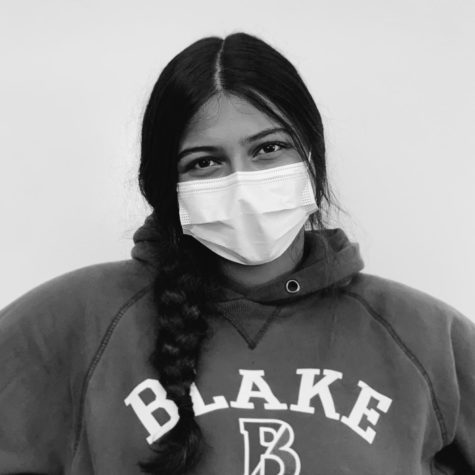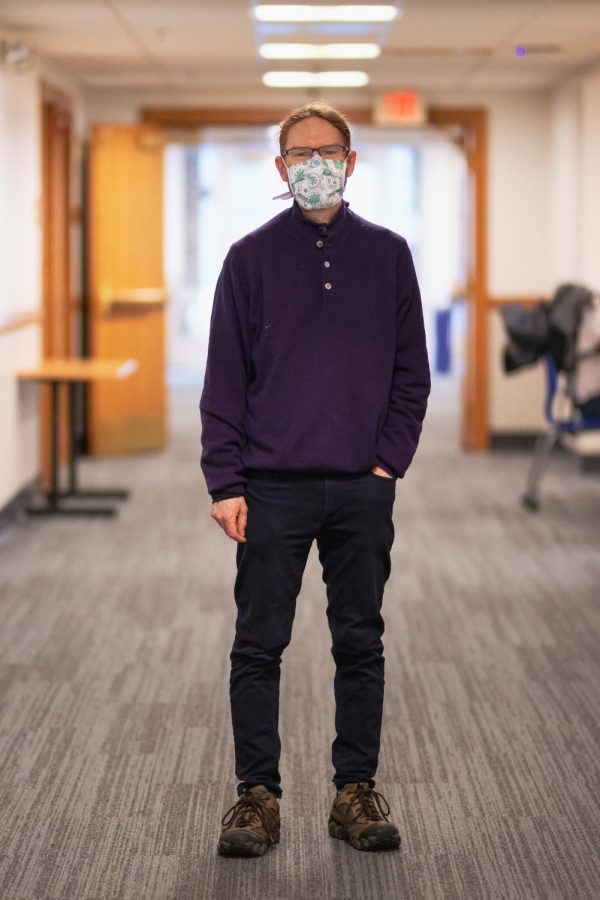Dr. Cantrell Chronicles Unusual Journey to Teaching
From an early interest in mathematics to astronomy research, living in Japan, to teaching math at Blake, Dr. Cantrell presents his unique road to teaching mathematics at the Upper School
Cantrell shares how he enjoys spending his time: “Cooking, biking, cooking, more cooking, especially Japanese food. Japanese food in Japan is actually very different from Japanese food in the U.S., and so we get lots of stuff sent from Japan. You can’t get fresh fish sent from Japan, but you can get lots of dried ingredients and stuff.”
Andy Cantrell’s path to teaching math at the Blake Upper School was nothing short of extraordinary. Initially, Cantrell planned to study mathematics at Yale University; however, he had a change of heart and ended up receiving his PhD in Astronomy.
Mathematics:
Cantrell made the decision to switch in the middle of one of three ex- ams necessary to advance to the research portion of the PhD program in the math department: “In the middle of the third exam, which is eight hours long, I knew that I simply had to leave. The Math Department made me unhappy, and I wanted nothing to do with it. So I told them that I wasn’t feeling well, and I left the exam. And I went up and talked with the professors that I had been working with in Astronomy and said ‘Hey, can I change departments?’ and they made it happen. So before that exam was even over, I went back down to the Math Department and I dropped off my keys and said, that’s it, I’m done.” He adds, “I didn’t like the Math Department, and I did like the astronomers, and they were nice to me.”
Astronomy:
Despite his true pas- sion being the study of mathematics, Cantrell looks back on his time working in the Astronomy Department as “some of the happiest and most ex- citing of his life.” While at graduate school, he worked closely with astronomers working to understand how to calculate the mass of black holes that orbit stars. When he arrived, different groups were already measuring the same black holes, and coming up with wildly different answers. Cantrell’s role in this process was pivotal as he “found the source of their error.” This error was that “the star loses mass to the black hole and the mass falling into the black hole emits light, how much light this disc emits changes quite a bit over time, and basically … if this disc is very bright, then, it looks like the star is changing in brightness less than it actually is because a lot of the light is coming from [the disc] and this doesn’t change in brightness. So you might think ‘Oh it’s undergoing a 15% change in brightness throughout the orbit, but actually it’s undergoing a 30% change in brightness because a whole lot of the light is coming from the disc and you’re not accounting for that right.”
Japan:
After graduate school in 2011, Cantrell and his wife were living in Yokohama, Japan when the Tohoku Earthquake hit. He explains, “We came back to the U.S. for six weeks because the U.S. government was recommending that people get out of Japan if they could because of the nuclear situation … so I decided to apply for jobs then. And that totally didn’t pan out.” However, as soon as he and his wife moved back to Japan, Blake reached out to Cantrell and offered him a teaching position. Cantrell describes his reaction saying, “My first response was ‘you people are crazy there’s no way I’m getting on a plane going back to the U.S. after finally making it back here to this place that I love.’ But they seemed really interested and everywhere else that I’d talked to didn’t seem very interested … so I am here entirely because Blake offered me this job.”
Cantrell speaks to his appreciation for Japan: “I love Japan. I love everything about Japan … I love the gardens. I love the restaurants … [and] people in Japan are just really humble, even people who are really, really, extraordinarily good at what they do … People aren’t pretentious in the same way they are here.” He gives the example of one of his favorite restaurants, which only serves Soba noodles and a few sides. The chefs at this restaurant “Get buckwheat from different parts of Japan … grind it themselves, and … make the noodles on the spot.” Despite their extraordinary talent and work ethic, “They’re just so happy and delighted that you like their food.” In his free time, Cantrell cooks a lot of Japanese food and even orders dried ingredients from Japan.
In addition to the culture of Japan, Cantrell enjoys the freedom that is available to him in Japan: “I don’t really speak much Japanese at all. My wife is totally my translator for everything. And yet, I can kind of function better in Japan than I can in the U.S. because the transportation is so good. As somebody who doesn’t have a driver’s license, I can get anywhere in Tokyo. Living in Tokyo, you can go anywhere on a train and walking. That was kind of magical for me, just really having the freedom to go anywhere in this huge, incredible city.”
Teaching:
When shifting from academia to teaching, Cantrell was met with var- ious judgments: “Honestly, going into [high school] teaching from academia the thing everybody says is ‘oh you’re going to be so bored. You really want to teach Calculus? That’s so easy, you’re going to be so bored. You’re too smart for that.’” Despite these sentiments, Cantrell expresses his love for teaching saying, “I think this is totally not boring because every single year I meet all these differ- ent people and they’re all amazing and they’re all different. I never teach the same student twice, and that’s what makes it fun.” He adds that his love for teaching was greater than his desire to research, which is often the primary focus of professors.
Cantrell arrived at Blake soon after the Math Department had be- gun their switch to a more problem-based learning environment. The teachers had gone through work- shops and training sessions to make this shift, but problem-based learning seemed to come naturally to Cantrell: “I don’t even know any other way to teach math. Basically for me, math isn’t about facts, it’s about understanding. It’s not about skills and topics; it’s about concepts. And I don’t know how to get people to engage with concepts without having them do problems.” Cantrell connects this to his own childhood and how he learned best saying, “That’s kind of how I learned math as a student … I didn’t pay attention in lectures ever. I would just look at what the next theorems were going to be and think ‘oh, can I try to prove that myself? … I’m going to try to figure this out for myself and figure out what the next thing is going to be’ and then by the time the class got there, I was like ‘oh yeah, they’re doing that now, cool.’”
The importance Cantrell places on in class work and problem solving lends itself to the fact that his classes, pre- COVID-19, tend to come with little to none nightly homework, and very few assessments. His reasoning for this is that “If [nightly homework is] at a level where I feel like it’s really going to push students’ thinking, then it’s probably not something that I want them doing without me there because otherwise people are going to get really frustrated and unhappy, and I want to be there to intervene if that starts happening … I feel as though I don’t need very many tests because every single day I see what everybody’s doing in class.”
Cantrell adds that HTLP and RTLP have affected this due to “The distancing, not being able to look over people’s shoulders … I really don’t have that same sense that I used to have of what every single person is doing and how they’re thinking.”
Throughout the Journey:
A few years ago, Cantrell gave a speech about his epilepsy. He re- calls what he spoke about saying, “In high school, I was definitely having seizures, and you can’t get a driver’s license if you’re epileptic. The specific laws vary from state to state like how long you have to go without hav- ing a driver’s license, but I couldn’t at that point. And then little by little, everywhere I lived, I’ve just found ways to make it work. At this point, I could go learn to drive, but it would be a very large investment of time and there’s nothing that says that I won’t start having seizures again at some point. Basically, I can’t ever afford to have a life that revolves around having a car. If getting to my work required having a car, then having a seizure would mean quitting my job, and I can’t afford to take that risk. I just have to set my life up so it works without having a car.” For Andy Cantrell and his family, this looked like buying a house that was along a bus line that leads to Blake.

Hey! I’m Noor, I’m a senior, this is my second semester as an Editor-in-Chief, and I'm currently a features editor. I've edited News, Sports, Sci-tech,...

Hey there, I'm Betsy. My pronouns are she/her. My toxic personality trait is that I like my iced coffee more than I like my friends. Sorry not sorry. I'm...

